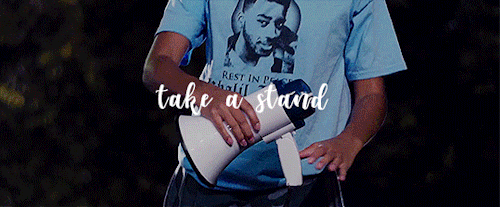
This is frankly embarrassing and a little shameful. I saw this movie in October and still haven’t been able to come up with what I think is an acceptable review. It’s partly the subject matter, and it’s partly my own particular mix of identities and privileges which allows me to just stay quiet rather than engaging. The Hate U Give is a story about police brutality, but it’s also about the power of Black communities to come together, to resist, and to rebuild. Everything that you think it is, it is – but that doesn’t necessarily guarantee it’s a movie worth watching, right? Hasn’t this story been told before? Well…
Not in this way; not in this time. The Hate U Give is the adaptation of Angie Thomas’s YA novel by the same name, centered around Starr, a teen girl living in Garden Heights, Georgia, and her family. One night, Starr and her friend Khalil (played with electric cool and charm by Algee Smith) are pulled over by police, and though Khalil is unarmed, the white officer shoots and kills him right in front of Starr. The rest of the film focuses on Starr’s grief and inner conflict about whether she should go public as the witness to the crime, for fear of how it will draw attention to her and her family.
I’m going to try to keep my thoughts to a minimum here and try to share the perspective of the Black reviewers who saw this movie because their voices are so often drowned out when it comes to depictions of their communities and experiences onscreen.
Some thoughts:
- If nothing else, this movie will be a master class for white folks on code-switching, or the different behaviors and vocabularies POC employ when they are amongst groups of their own race vs. groups of white people. Sharronda Williams of the review channel Pay or Wait praises the movie for its depiction of code-switching and how the issue of police brutality, particularly against Black people, starts these difficult conversations between friends who may have very different reactions and emotions to these types of murders.
- The performances are the only way subject matter this heavy can be this compelling without feeling like a chore. Amandla Stenberg’s performance as Starr is literally star-making (no pun intended). Not all critics felt that way – Soraya Nadia McDonald of The Undefeated points to the film’s tendency to devolve into melodrama, and a distinct lack of chemistry between Stenberg and her white boyfriend, K.J. Apa. But most people agree that Stenberg is giving her all in this role in spite of a somewhat distracting voiceover narration. Russell Hornsby is the other standout as Starr’s father, Maverick, and serves as the beating heart at the center of Starr’s entire family.
- Courtney Small of CinemaAxis pointed out one of the scenes that I wasn’t sure how to feel about. I will quote his review at length: “The one complaint to be had with the film is that director George Tillman Jr. tries a little too hard at times to appease those who fall into the “All Lives Matter” camp. For example, there is a sequence where Starr’s police officer uncle Carlos (Common) tries to explain what goes through a cop’s mind when they pull over an individual. The scene is shot in a way that is clearly meant to convey a “we are not bad, just misunderstood” message. However, the speech is undermined by Carlos admitting, when questioned further, that he is less likely to shoot if it is a white person in the exact same situation.”
- The main takeaway from the title, and the film’s central thesis, comes from a Tupac song – T.H.U.G. L.I.F.E. stands for “The Hate U Give Little Infants Fucks Everybody.” Institutional racism, microaggressions, calls for civility and working within the existing systems to change those systems – all that starts from birth for Black folks. And the values and lessons you teach children will be absorbed even if you’re not sure they’re really listening. As Tony Baker says in his movie review channel, kids are always watching, for good or bad. They see all of the complicated racial divides in our country and the way racially-motivated police brutality works, and they soak it all up. We need to make sure we’re instilling in our children the values that we want to see through both our intentional and unintentional actions.
This film is timely, important, and does an excellent job of showcasing the lived experience of so many Black Americans whose lives are treated as disposable or less than by the institutions that are supposed to protect them. It is an important movie to see, especially for white folks who are willing to take a crash course in another lived experience that doesn’t match their own.
